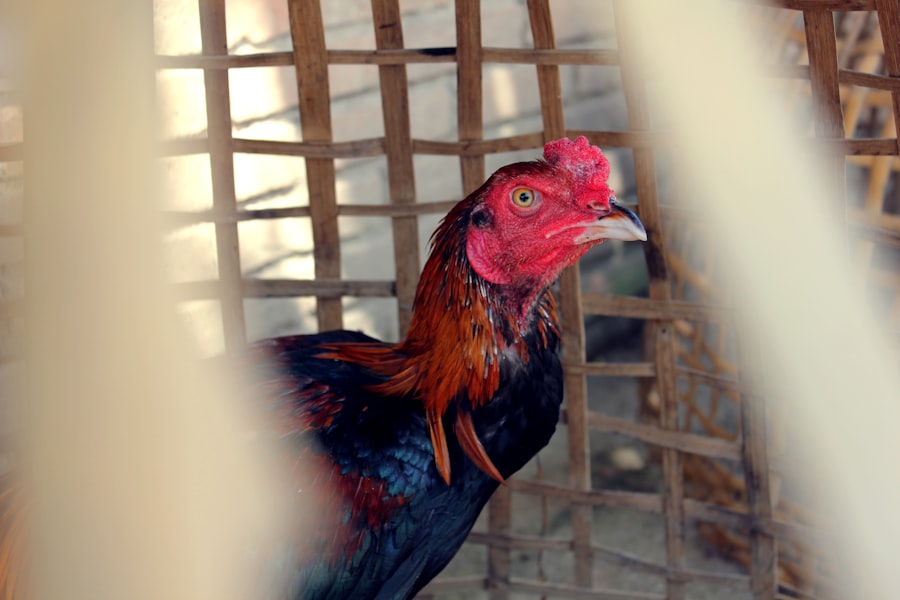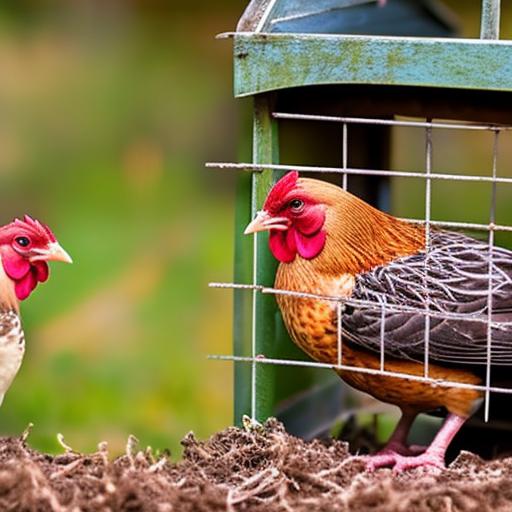Keeping chickens in a cage is a popular method of poultry farming that has both benefits and drawbacks. On one hand, it can make maintenance easier and provide protection from predators. On the other hand, it can limit the space available to the chickens and potentially lead to health problems. In this article, we will explore the various aspects of keeping chickens in a cage, including understanding their needs, the pros and cons of this method, choosing the right cage, designing and building a chicken coop, ensuring proper ventilation and lighting, feeding and watering the chickens, cleaning and maintaining the coop, and ensuring the health and safety of the chickens.
Key Takeaways
- Understanding the needs of chickens is crucial for their health and well-being.
- Keeping chickens in a cage has both pros and cons that should be carefully considered.
- Choosing the right cage for your chickens is important to ensure their comfort and safety.
- Designing and building a chicken coop requires attention to ventilation and lighting.
- Feeding, watering, cleaning, and maintaining your chicken coop are essential for the health and safety of your chickens.
Understanding the Needs of Chickens
Chickens have basic needs that must be met in order for them to thrive. These needs include food, water, shelter, and space. When keeping chickens in a cage, it is important to ensure that these needs are adequately met. Chickens require a balanced diet that includes grains, protein, vitamins, and minerals. They also need access to fresh water at all times. In terms of shelter, chickens need a safe and secure space where they can roost and lay eggs. Finally, chickens require enough space to move around comfortably and engage in natural behaviors such as scratching and dust bathing.
The Pros and Cons of Keeping Chickens in a Cage
There are several advantages to keeping chickens in a cage. One of the main benefits is that it makes maintenance easier. With chickens confined to a cage, it is easier to clean up their waste and keep the area tidy. Additionally, cages provide protection from predators such as foxes or raccoons. Another advantage is that cages can be more secure than free-range environments, reducing the risk of disease transmission from wild birds or other animals.
However, there are also disadvantages to keeping chickens in a cage. One major drawback is the limited space available to the chickens. This can lead to stress and behavioral problems, as well as reduced egg production. Additionally, chickens kept in cages may be more prone to health problems such as obesity or foot injuries. Finally, cages can restrict the chickens’ ability to engage in natural behaviors, which can negatively impact their overall well-being.
Choosing the Right Cage for Your Chickens
When choosing a cage for your chickens, there are several factors to consider. The type of cage is an important consideration. Wire cages are a popular choice because they allow for good ventilation and easy cleaning. However, they can be uncomfortable for the chickens’ feet and may require additional bedding to provide cushioning. Plastic cages are another option, which can be more comfortable for the chickens but may not provide as much ventilation.
Size is another important factor to consider when choosing a cage. The size of the cage should be appropriate for the number of chickens you plan to keep. It is recommended to provide at least 2 square feet of space per chicken. Additionally, the cage should be sturdy and durable to withstand the wear and tear of daily use.
Designing and Building a Chicken Coop
A chicken coop is an essential component of keeping chickens in a cage. It provides a safe and secure space for the chickens to roost, lay eggs, and seek shelter from the elements. When designing and building a chicken coop, it is important to use sturdy materials that can withstand the elements and protect the chickens from predators.
The size of the coop should be appropriate for the number of chickens you plan to keep. It should provide enough space for the chickens to move around comfortably and engage in natural behaviors. Additionally, the coop should have adequate ventilation to ensure good air flow and prevent the buildup of ammonia from chicken waste.
Understanding the Importance of Ventilation and Lighting

Proper ventilation is crucial in a chicken coop to ensure good air quality and prevent respiratory problems. The coop should have windows or vents that can be opened and closed as needed to regulate the temperature and humidity. It is also important to provide adequate lighting in the coop. Chickens require a certain amount of light each day to maintain their circadian rhythm and lay eggs. Natural light is ideal, but if that is not possible, artificial lighting can be used.
Feeding and Watering Your Chickens in a Cage
Feeding and watering chickens in a cage requires some attention to detail. Chickens should be provided with a balanced diet that includes grains, protein, vitamins, and minerals. There are various types of feed available, including pellets, crumbles, and mash. It is important to choose a feed that is appropriate for the age and breed of your chickens.
Water should be provided at all times and kept clean and fresh. There are different types of water containers available, such as troughs or nipple drinkers. It is important to regularly clean and disinfect the water containers to prevent the spread of disease.
Cleaning and Maintaining Your Chicken Coop
Keeping a chicken coop clean and well-maintained is essential for the health and well-being of the chickens. Regular cleaning helps prevent the buildup of waste and reduces the risk of disease transmission. The coop should be cleaned at least once a week, with soiled bedding removed and replaced with fresh bedding. It is also important to regularly disinfect the coop to kill any bacteria or parasites that may be present.
In addition to regular cleaning, it is important to inspect the coop for any signs of damage or wear. Any repairs or maintenance should be done promptly to ensure the safety and security of the chickens.
Ensuring the Health and Safety of Your Chickens
Keeping chickens in a cage can pose certain health risks if proper precautions are not taken. One common health problem in caged chickens is obesity, which can lead to a range of other health issues. To prevent obesity, it is important to provide a balanced diet and ensure that the chickens have enough space to move around and engage in natural behaviors.
Other common health problems in caged chickens include foot injuries and respiratory issues. To prevent foot injuries, it is important to provide a comfortable and clean surface for the chickens to walk on. Regular cleaning and disinfecting can help prevent respiratory problems by reducing the buildup of ammonia from chicken waste.
Is Keeping Chickens in a Cage Right for You?
In conclusion, keeping chickens in a cage has both advantages and disadvantages. It can make maintenance easier and provide protection from predators, but it can also limit the space available to the chickens and potentially lead to health problems. Before deciding whether to keep chickens in a cage, it is important to consider your own needs and preferences, as well as the needs of the chickens. If you have limited space or are concerned about predators, keeping chickens in a cage may be a good option for you. However, if you have the space and resources to provide a larger, more natural environment for the chickens, free-range or pasture-based systems may be more suitable. Ultimately, the decision should be based on what is best for both you and your chickens.
If you’re interested in keeping chickens in a cage, you might also want to learn about the benefits of providing them with a spacious and comfortable living environment. Check out this informative article on “Farmhouse Chicken Coop: Creating a Cozy Home for Your Feathered Friends” from Poultry Wizard. It offers valuable insights on how to design and build a chicken coop that promotes their well-being and allows them to exhibit natural behaviors. Discover the importance of proper ventilation, nesting boxes, and roosting bars to ensure your chickens are happy and healthy. Read more here.
FAQs
Can I keep chickens in a cage?
Yes, you can keep chickens in a cage, but it is not recommended as it is not a humane way to keep them.
What is the recommended way to keep chickens?
The recommended way to keep chickens is to provide them with a spacious and secure coop and run area where they can move around freely, forage, and engage in natural behaviors.
What are the disadvantages of keeping chickens in a cage?
Keeping chickens in a cage can lead to health problems, stress, and behavioral issues. It can also limit their ability to move around and engage in natural behaviors, which can affect their overall well-being.
What are the benefits of keeping chickens in a coop and run?
Keeping chickens in a coop and run allows them to move around freely, forage, and engage in natural behaviors. It also provides them with protection from predators and the elements, which can help keep them healthy and safe.
What should I consider before keeping chickens?
Before keeping chickens, you should consider the amount of space you have available, the local regulations and zoning laws, the cost of building or buying a coop and run, and the time and effort required to care for them properly.
Meet Walter, the feathered-friend fanatic of Florida! Nestled in the sunshine state, Walter struts through life with his feathered companions, clucking his way to happiness. With a coop that’s fancier than a five-star hotel, he’s the Don Juan of the chicken world. When he’s not teaching his hens to do the cha-cha, you’ll find him in a heated debate with his prized rooster, Sir Clucks-a-Lot. Walter’s poultry passion is no yolk; he’s the sunny-side-up guy you never knew you needed in your flock of friends!







